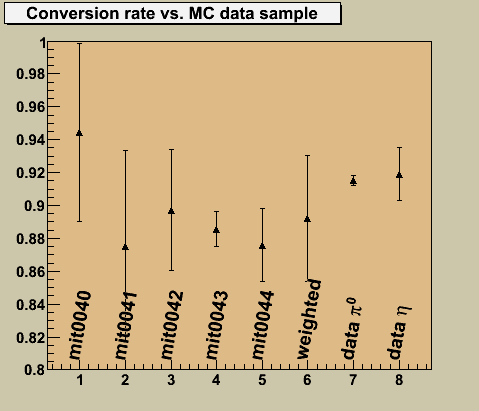Comparison of conversion rates in MC to data, take 3
Updated on Mon, 2009-06-15 09:35. Originally created by jwebb on 2009-06-15 09:35.

Abstract: We compare the conversion rate for simulated π0 events in the 1st radiator of the endcap to data. We find a conversion rate of 88% +/- 4% for the simulation, compared with 91.5% +/- 0.3% for the data, where we count any signal w/in R<0.3 of the pion candidate as a conversion.
Contents:
0. Monte Carlo Data Sample
EEMC Jet/QCD backrgound events from the MIT production.
| Sample | pT min | pT max | weight |
| mit0040 | 2 | 3 | 8.12 |
| mit0041 | 3 | 4 | 7.66 |
| mit0042 | 4 | 5 | 7.00 |
| mit0043 | 6 | 9 | 0.587 |
| mit0044 | 9 | 15 | 0.844 |
Last partonic pT bin yielded precisely 3 reconstructed pions after CPV, so we ignored it for the current study.
Processed files located here...
/star/institutions/uky/betan/
... and here...
/star/institutions/iucf/betan/
1. Event Reconstruction
The pi0 maker is configured with low seed thresholds, since we will be performing isolation and charged-particle cuts on the data which will kill off backgrounds.
Trigger simulation
- Use StTriggerUtilities for trigger simulation
- Timestamp: dbMk->SetDateTime(20060522, 55000); // timestamp R7142018
- Simulate trigger IDs 137641 137652 137551 137622... should be similar to the trigger mix used in the data, though thresholds will change in the data
2. Event Selection
Reconstruct pi0 candidates, and analyze events within the window 110 MeV to 170 MeV.
- Isolation cut: Sum energy w/in R<0.3 of the leading photon in the pair. Require 90% of energy in the tower containing the leading photon.
- CPV cut: Sum energy deposited in preshower-1 w/in R<0.3. Veto events with energy > 0
- Analysis cut: Sum energy deposited in preshower-2 w/in R<0.3. Increment conversion histogram(s) when energy > 0 (3 sigma > ped).
3. Results
I'll forgoe showing invariant mass spectra for each partonic pT sample. The results are similar to the Comparison of conversion rates in MC to data, take 2 study. What is relevant here is the agreement between data and MC for the conversion rates in the preshower layers. The conversion rates for the inclusive MC sample are consistent with the conversion rates seen in the inclusive data sample.

»
- jwebb's blog
- Login or register to post comments
